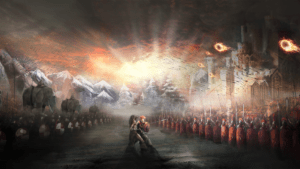Introduction
Commencing the Olivet Discourse, Jesus provides a premonitory prophecy regarding the inevitable rise of false prophets/teachers (Matthew 24:3-5, 23-28). Similarly, in anticipation of his imminent martyrdom, Peter writes a final letter warning about false teachers and exhorting believers to remain vigilant. In concluding his letter, Peter writes, “Therefore, dear friends, since you know this in advance, be on your guard so that you are not led away by the error of lawless people and fall from your own stability” (2 Peter 3:17).1 These admonitions are not anomalous, as the Bible addresses the issue of false prophets/teachers no less than 65 times.2 Accordingly, the Christian must remain observant, diligently studying the Scriptures to identify and avoid heretical teachings.3 This brief article will define the difference between historic Christianity and modern cults in America while demonstrating why the Jehovah’s Witnesses receive classification as a cult rather than a Christian denomination.
Characteristics of a Christian Cult
Differentiating between a false religion and a Christian Cult is an important first step in this inquiry. There exists a passel of religious systems throughout the world, each making truth-claims concerning external reality. A religion is objectively false if any of its fundamental beliefs fail to correspond with reality. A Christian cult differs in that the group of iconoclasts claims to be a denomination of the Christian faith while simultaneously denying one or more fundamental doctrines.4 Consequently, all Christian cults are false religions, but not all false religions are cults—since many do not classify themselves as a Christian denomination.
To identify a cult, one must first define the essential doctrines of Christianity. Essential Christian doctrines include:5
1. The Hypostatic Union (cf. John 8:58, Exod. 3:14, 1 John 4:2-3; John 1:1, 14; 6:39-41; 10:30-33; 20:28; Col. 2:9; Phil. 2:5-8; Heb. 1:8; Titus 2:13).
2. Vicarious Satisfaction (Atonement) and Salvation by Grace (cf. 1 Pet. 2:24, 2 Cor. 5:21, Rom. 4:25, 1 John 2:2, 4:10; John 11:25-26; 14:6; Eph. 2:8-9; Gal. 2:21, 5:4; Rom. 3:20; 4:1-11; 10:1-13).
3. Monotheism and the Doctrine of the Trinity (cf. Deut. 4:35; 6:4; Exodus 20:3-6; Neh. 9:6; Psalm 90:2; Isaiah 43:10; 44:6, 8; 3:16-17; 28:19; 1 Cor. 12:4-6; 2 Cor. 13:14; Eph. 4:4-6).
4. The Bodily Resurrection of Christ (cf. 1 Cor. 15:14-17; John 2:19-21, 20:19-20; Luke 24:38-39; 1 Thess. 4:13-18; 1 Cor. 15:20-23, 51-55).
5. The Inspiration and Authority of Scripture (cf. 2 Tim. 3:16-17; 2 Pet. 1:20-21).
While there are many important doctrines within Christianity, these beliefs provide the essential basis of historic Christianity and all legitimate denominations will affirm these indispensable declarations. Any religious group identifying themselves as “Christian,” while simultaneously denying one or more of these core doctrines—either implicitly or explicitly—receives classification as a cult.
Jehovah’s Witnesses Are a Christian Cult
Although Jehovah’s Witnesses declare themselves Christian, their understanding of Jesus is categorically different from that of historic Christianity, and they adamantly deny many of the essential Christian doctrines.6 The Jehovah’s Witnesses official website highlights their theological departure from historical Christianity, differentiating themselves from traditional Protestant denominations. The website declares, “Although Protestant faiths reject certain features of Catholic worship, Reformation leaders retained certain Catholic dogmas, such as belief in the Trinity, hellfire, and the immortality of the human soul. Jehovah’s Witnesses, however, believe that those doctrines not only contradict the Bible but also promote a distorted view of God.”7
Their Christology is most important for this inquiry, as Jehovah’s Witnesses deny the deity of Jesus, condemning Trinitarian doctrine as heresy and brashly proclaiming, “Satan is the originator of the trinity doctrine… The plain truth is that this is another of Satan’s attempts to keep God-fearing persons from learning the truth of Jehovah and his Son, Christ Jesus. No, there is no trinity!”8 Jehovah’s Witnesses are monotheistic, recognizing God (Jehovah) as the one true God, while identifying Jesus as God’s son and the Holy Spirit as merely an impersonal force—an emanation of God’s power, used in exercising His will.9 To account for Jesus’ miraculous activities while simultaneously denying his deity, Jehovah’s Witnesses declare Jesus is the incarnation of Michael the Archangel.10
Departing further from historic Christianity, Jehovah’s Witnesses deny the physical resurrection of Jesus—proclaiming a spiritual resurrection instead.11 Consequently, it would be a mistake to classify the Jehovah’s Witnesses as a Christian denomination, as their theological doctrines are fundamentally contrary to historic Christianity and the biblical data. Accordingly, the Jehovah’s Witnesses origination meets the criteria for a Christian cult.
Conclusion
In conclusion, a Christian cult is a religious group claiming Christian affiliation, while simultaneously denying any fundamental doctrine of historic Christianity. The Jehovah’s Witnesses maintain that their religious system is fundamentally Christian, while emphatically denying the hypostatic union, the Trinity, and the physical resurrection of Jesus. Such denials have significant logical and theological ramifications for the doctrines of vicarious satisfaction (atonement), salvation by grace, and Scriptural authority, leading one to question if the Jehovah’s Witnesses maintain any of the fundamental doctrines of historic Christianity. While brevity excludes comprehensive analysis of central principles held by the Jehovah’s Witnesses, it is evident that the group embodies a modern cult in America, not a Christian denomination.
- All Scriptural references are from the Holman Christian Standard Bible, unless noted otherwise.
- Cf. Matt. 7:15-20; 15:1-20; 16:5-12; 24:3-5, 23-28; Gal. 1:6-10; 2:1-10; 5:7-15; 1 Tim. 6:3-5; 2 Pet. 1:16-2:22; 3:14-18; 1 John 4:1-3; Deut. 13:1-18; 18:15-22; 1 Kings 22:1-28; Isa. 3:1-12; 8:11-22; 9:8-10:4; Jer. 2:1-13; 5:1- 31; 8:4-17; 10:17-25; 14:1-18; 20:1-6; 23:9-40; 27-32; Lam. 2:1- 22; Ezek. 11:1-13; 13:1-23; 22:23-31; 34:1-10; Mic. 2:6-11; 3:1-12; Mal. 2:1-9; Mark 8:14-21; Luke 12:1-12; 21:8- 19; Acts 13:4-12; 15:1-5, 22-29; 20:17-38; Rom. 16:17-20; 2 Cor. 11:1-21; Eph. 4:7-16; Phil. 3:17-4:1; Col. 2:1-10; 2 Thess. 2:1-12; 1 Tim. 1:3-11; 4:1-11; 6:3-10, 20-21; 2 Tim. 2:14-4:5; Titus 1:10-16; 3:9-11; Heb. 13:7-17; James 3:1-12; 1 John 2:18-27; 3:24-4:6; 2 John 7-11; Jude 3-11; Rev. 2:1-7, 12-29; 13:11-18; 16:12-16; 9:17-21; 20:7-10.
- The Bereans exemplify this principle in Acts 17:10-12.
- For the purposes of this discussion, we are speaking of a theological cult, not a social cult.
- The doctrine of hypostatic union includes the incarnation of Christ, His deity, His humanity, and His Immaculate Conception and virgin birth. Vicarious satisfaction (atonement) includes the creation of man imago dei, and the doctrine of original sin. Monotheism includes the affirmation that God created the universe (both physical and immaterial aspects) ex nihilo, His involvement in the universe, and His active sustainment of His creation (cf. Gen. 1:1; Col. 1:17; Heb. 1:3).
These doctrines represent a systematic articulation of the biblical data and are unmistakably preserved through Christian history (cf. the Ecumenical and Historic Christian Creeds, e.g., the Nicene, Chalcedonian, and Athanasian Creeds).
- Jehovah’s Witnesses openly declare themselves Christian; see “Are Jehovah’s Witnesses Christians?” Watch Tower Bible and Tract Society of Pennsylvania, accessed June 17, 2017, https://www.jw.org/en/jehovahs-witnesses/faq/are-jehovahs-witnesses-christians/#?insight%5Bsearch_id%5D=d824b54a-cfef-4171-81d3-5a392f0eea80&insight%5Bsearch_result_index%5D=46.
- “Are Jehovah’s Witnesses a Protestant Religion?” Watch Tower Bible and Tract Society of Pennsylvania, accessed June 17, 2017, https://wol.jw.org/en/wol/d/r1/lp-e/2009813 [emphasis added].
Interestingly, the Jehovah’s Witnesses also deny eternal damnation and the immortality of the human soul. According to their theological framework, upon physical death the human soul undergoes annihilation. God intends to bring some back to life while destroying those who reject Him. Accordingly, Jehovah’s Witnesses deny the doctrine of eternal punishment in hell. See Myth 1: The Soul Is Immortal,” Watch Tower Bible and Tract Society of Pennsylvania, accessed June 17, 2017, https://wol.jw.org/en/wol/d/r1/lp-e/2009801; “What Do Jehovah’s Witnesses Believe?” Watch Tower Bible and Tract Society of Pennsylvania, accessed June 17, 2017, https://www.jw.org/en/jehovahs-witnesses/faq/jehovah-witness-beliefs/.
- Let God Be True Second Edition, (Brooklyn, NY: Watchtower Bible and Tract Society, 1952), 101, 111.
- “What Is the Holy Spirit?” Watch Tower Bible and Tract Society of Pennsylvania, accessed June 17, 2017, https://www.jw.org/en/bible-teachings/questions/what-is-the-holy-spirit/; and “Should You Believe in the Trinity?” Watch Tower Bible and Tract Society of Pennsylvania, accessed June 17, 2017, https://wol.jw.org/en/wol/d/r1/lp-e/102013286?q=trinity&p=par.
- “Jesus Christ,” Watch Tower Bible and Tract Society of Pennsylvania, accessed June 17, 2017, https://wol.jw.org/en/wol/d/r1/lp-e/1101989240?q=Jesus+God&p=par.
This declaration produces various theological ramifications when considering the principles of vicarious satisfaction (atonement) and salvation by grace. Although Jehovah’s Witnesses affirm salvation by grace alone, this dogma encounters logical inconsistencies if Jesus is not both human and divine.
- “After Jesus’ Resurrection, Was His Body Flesh or Spirit?” Watch Tower Bible and Tract Society of Pennsylvania, accessed June 17, 2017, https://www.jw.org/en/bible-teachings/questions/jesus-body/.




